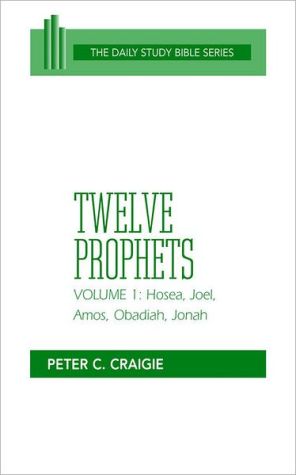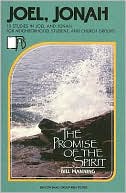Jonah-Ruth: Love Crosses Boundaries
Two of the most beloved Old Testament stories are the stories of Jonah and Ruth. In Jonah/Ruth: Love Crosses Boundaries, you'll discover how God breaks down barriers between people as you see these Old Testament Stories through new eyes.\ A Guided Discovery of the Bible The Bible invites us to explore God’s word and reflect on how we might respond to it. To do this, we need guidance and the right tools for discovery. The Six Weeks with the Bible series of Bible discussion guides offers both...
Search in google:
Created for busy people, Catholic Perspectives: Six Weeks with the Bible is a series of concise, self-contained, one-volume Scripture guides that can be used by individuals or groups. Each guide gives a brief but substantial introduction to a particular biblical book. This series is designed specifically for Catholic adults who want to learn about the Bible and it's applications to daily living but whose busy lives don't give them time to commit to long-term study programs or the exhaustive treatments of annotated study Bibles. This particular volume explores the Jonah and Ruth.
How to Use This Guide\ \ The Bible is like a vast national park filled with various types of terrain and impressive natural features. The park is so big that you could spend months, even years, getting to know it. Is it worth making a brief visit?\ In fact, a brief visit to a park, if carefully planned, can be enjoyable and worthwhile. In a few hours you can drive through the park and pull over at a handful of sites. At each stop you can get out of the car, take a short trail through the woods, listen to the wind blowing in the trees, get a feel for the place.\ You might compare this booklet to a short visit to a national park. We will read the books of Jonah and Ruth—two of the finest stories in the Bible. Because the stories are quite short, we will be able to take a leisurely walk through each one, thinking carefully about what we are reading and what it means for our lives today. While the books are short, they touch on central themes in God’s revelation to us: God’s mercy and faithfulness and the response his mercy and faithfulness call forth from us.\ This guide provides everything you need to explore Jonah and Ruth in six discussions—or to do a six-part exploration on your own. Introductions (pages 6 and 30) will prepare you to get the most out of your reading. The weekly sections provide explanations that highlight what the words of Scripture mean for us today. Equally important, each section supplies questions that will launch you into fruitful discussion, helping you both to explore Jonah and Ruth for yourself and to learn from one another. If you’re using the booklet by yourself, the questions will spur your personal reflection.\ Each discussion is meant to be a guided discovery.\ Guided. None of us is equipped to read the Bible without help. We read the Bible for ourselves but not by ourselves. Scripture was written to be understood and applied in and with the church. So each week “A Guide to the Reading,” drawing on the work of modern biblical scholars and Christian writers of the past, supplies background and explanations. The guide will help you grasp the messages of Jonah and Ruth. Think of it as a friendly park ranger who points out noteworthy details and explains what you’re looking at so you can appreciate things for yourself.\ Discovery. The purpose is for you to interact with God’s Word. “Questions for Careful Reading” is a tool to help you dig into Jonah and Ruth and examine them carefully. “Questions for Application” will help you consider what these stories mean for your life here and now. Each week concludes with an “Approach to Prayer” section that helps you respond to God’s Word. Supplementary “Living Tradition” and “Saints in the Making” sections offer the thoughts and experiences of Christians past and present in order to show you what Scripture has meant to others—so that you can consider what it might mean for you.\ How long are the discussion sessions? We’ve assumed you will have about an hour and a half when you get together. If you have less time, you’ll find that most of the elements can be shortened somewhat.\ Is homework necessary? You will get the most out of the discussions if you read the weekly material in advance of each meeting. But if participants are not able to prepare, have someone read the “Guide to the Reading” section aloud to the group at the points where it occurs in the weekly material.\ What about leadership? If you happen to have a world-class biblical scholar in your group, by all means ask him or her to lead the discussions. But in the absence of any professional Scripture scholars, or even accomplished biblical amateurs, you can still have a first-class Bible discussion. Choose two or three people to be facilitators, and have everyone read “Suggestions for Bible Discussion Groups” before beginning (page 76).\ Does everyone need a guide? a Bible? Everyone in the group will need their own copy of this booklet. It contains the text of Jonah and Ruth, so a Bible is not absolutely necessary—but each participant will find it useful to have one. You should have at least one Bible on hand for your discussion. (See page 80.)\ How do we get started? Before you begin, take a look at the suggestions for Bible discussion groups (page 76) and individuals (page 79).\ Jonah: A Man Who Was Irritated with God\ \ Centuries before the birth of Christ, an Israelite storyteller asked himself some what-ifs.\ What if a genuine prophet refused to cooperate with God, while all around him pagans responded to God at the slightest suggestion?\ What if this prophet knew how to compose lovely prayers, but rather than pouring out his inner thoughts to God, he hoarded secret anger against God?\ What if he got depressed not because he was unable to get people to turn to the Lord but because he succeeded in leading people to turn to the Lord?\ Our storyteller stirred these possibilities around, and into his mind came the picture of a prophet: not a Charlton Heston type of prophet, a figure of seriousness and gravity, but a lightweight fellow, a Stan Laurel kind of prophet—the sort of person who, when faced with imminent catastrophe, might take a nap. With this figure in view, the storyteller was ready to put pen to papyrus.\ “Now,” he began, “the word of the Lord came to Jonah, saying, ‘Go at once to Nineveh and cry out against it.’ But Jonah set out to flee from the presence of the Lord.” The statement “The word of the Lord came to so-and-so” was a standard biblical way of reporting that God had entrusted a message to a prophet. “So-and-so set out to flee from the presence of the Lord” was a very nonstandard way for a prophet to respond! Obviously Jonah was going to be an unusual prophet.\ Reading the story of Jonah, we can sense that the author was pleased with his literary creation. Jonah is an entertaining nonhero. We have no way of knowing whether the author also thought that his story was inspired by God. But many people in Israel did. They recognized in this little story a message from God, and they showed their recognition by placing it in the library of Israel’s inspired writings—the library that has become the Old Testament of the Christian Bible.\ In the library of the Bible we find history and law, prophecies and letters. Amid these imposing volumes, is there a place for a little humor? Apparently so, for if humor lies in perceiving an incongruity, there is plenty of humor in this short story. At every turn, Jonah violates the expectations that Israelite readers would have had. For example, Abraham prayed for the wicked city of Sodom to be spared divine retribution; Jonah gets angry because God does spare a city. Job cried out in anger against the Lord for being harsh to the innocent; Jonah cries out in protest because the Lord shows mercy to the guilty. Elsewhere in the Bible, the people of Israel often reject the warnings of prophets, even when they speak at length. In the book of Jonah, pagans respond as soon as a prophet opens his mouth.\ Of course, to describe the story of Jonah as humorous is not to say that it is not also serious. Everyone who has ever laughed at a political cartoon knows how serious humor can be.\ Detecting the serious issues beneath the surface of the story is part of the enjoyment of reading Jonah. I will not spoil the fun by offering a full-scale discussion in this introduction. Before we begin, however, it may be helpful to explain a few elements in the story’s background. This background was familiar to the ancient audience but is unfamiliar to most of us today.\ The author identifies the Jonah of the story with a real Jonah, Jonah son of Amittai, who lived in the eighth century before Christ and is briefly mentioned in one of the historical books of the Bible (2 Kings 14:25). This places Jonah at a particular point in Israel’s history: the story takes place a generation or so before the armies of the Assyrian Empire descended on Israel, grinding the northern portion of the country to dust and turning the southern portion into a political satellite.\ Even in an age of ruthless warfare, the Assyrians were known for their savagery. They incinerated cities, drove people from their homes, and abused prisoners of war. One of the Assyrian emperor’s palaces was decorated with wall panels that proudly showed his soldiers performing what today we would call military atrocities and crimes against humanity.\ It is to the capital of this evil empire, to Nineveh (in present-day Iraq), that God sends Jonah to preach. The first readers of the story lived after the Assyrian onslaught. They could readily understand why Jonah might have been reluctant to carry out such a mission.\ I have spoken of Jonah as a short story. Did it not really happen? Some readers may wonder whether denying that Jonah is historical betrays skepticism about miracles, with which the story is loaded. Does interpreting Jonah as fiction reduce its importance?\ For centuries Christians and Jews did consider the story of Jonah to be historical. In the fifth century, for example, Cyril, the bishop of Alexandria in Egypt, defended the story against the charge that the miracles it recounts are impossible. “Certainly what happened to Jonah is unexpected and beyond reason and custom,” Cyril admitted. “But if the all-powerful God wished to accomplish it, who will refuse to believe it?” Cyril refuted the arguments of the book’s pagan mockers by pointing out that in their own religious literature they encountered many things stranger than a sea monster saving a prophet by swallowing him.\ However, it is not because of skepticism but because of an analysis of the text itself, its language and style, that most scholars today regard Jonah as an imaginative story. And this view does not make the story less important, any more than Jesus’ stories about a kindly Samaritan and a wayward son (Luke 10; 15) are less important than accounts of actual people. The questions the book of Jonah raises are no less serious and the messages it conveys are no less true than if the story were historical fact.\ Before you begin to read the book of Jonah, let me offer a few suggestions for how to get the most out of your reading:\ ♦ The author refrained from telling us everything we might like to know about why Jonah does what he does; this forces us to try to figure Jonah out for ourselves. Jonah is a puzzling person, so be prepared to be puzzled! Be ready for a story where the storyteller leaves us guessing until the end—and even then.\ ♦ The author of Jonah was a talented storyteller (it seems a shame that none of his other stories have survived). The story is very cleverly put together. Every word counts. To get the most out of the story, slow down! Read carefully, and reread. I suggest reading the whole story in one sitting. It doesn’t take long. (The text is given in Weeks 1 and 2.)\ ♦ As you read, ask yourself, How am I like Jonah—and do I want to be? At the end of the story, God puts a question to Jonah that challenges him to change. In what way is God’s question also directed to you? What would it mean for you to answer God’s question?\ ♦ When you get to the end, ask yourself, What is the central, serious issue that underlies this story? Why did the author decide to deal with this issue by means of a little humor? What makes this issue so difficult to confront? Where do I face this issue in my own life?\ \ \ Week 1\ Flight, Storm, and Rescue\ \ Questions to Begin\ 15 minutes Use a question or two to get warmed up for the reading.\ \ 1 What was your scariest experience while traveling?\ 2 When has a stranger been especially helpful to you on a trip?\ 3 Describe an incident when danger spurred you to pray.\ \ Opening the Bible\ 5 minutes Read the passage aloud. Let individuals take turns reading paragraphs.\ \ The Reading: Jonah 1:1–2:10\ “This Is a Fine Mess You’ve Gotten Us Into!”\ 1 Now the word of the Lord came to Jonah son of Amittai, saying, 2 “Go at once to Nineveh, that great city, and cry out against it; for their wickedness has come up before me.” 3 But Jonah set out to flee to Tarshish from the presence of the Lord. He went down to Joppa and found a ship going to Tarshish; so he paid his fare and went on board, to go with them to Tarshish, away from the presence of the Lord. 4 But the Lord hurled a great wind upon the sea, and such a mighty storm came upon the sea that the ship threatened to break up. 5 Then the mariners were afraid, and each cried to his god. They threw the cargo that was in the ship into the sea, to lighten it for them. Jonah, meanwhile, had gone down into the hold of the ship and had lain down, and was fast asleep. 6 The captain came and said to him, “What are you doing sound asleep? Get up, call on your god! Perhaps the god will spare us a thought so that we do not perish.”\ 7 The sailors said to one another, “Come, let us cast lots, so that we may know on whose account this calamity has come upon us.” So they cast lots, and the lot fell on Jonah. 8 Then they said to him, “Tell us why this calamity has come upon us. What is your occupation? Where do you come from? What is your country? And of what people are you?”\ 9 “I am a Hebrew,” he replied. “I worship the Lord, the God of heaven, who made the sea and the dry land.”\ 10 Then the men were even more afraid, and said to him, “What is this that you have done!” For the men knew that he was fleeing from the presence of the Lord, because he had told them so. 11 Then they said to him, “What shall we do to you, that the sea may quiet down for us?” For the sea was growing more and more tempestuous.\ 12 He said to them, “Pick me up and throw me into the sea; then the sea will quiet down for you; for I know it is because of me that this great storm has come upon you.”\ 13 Nevertheless the men rowed hard to bring the ship back to land, but they could not, for the sea grew more and more stormy against them. 14 Then they cried out to the Lord, “Please, O Lord, we pray, do not let us perish on account of this man’s life. Do not make us guilty of innocent blood; for you, O Lord, have done as it pleased you.” 15 So they picked Jonah up and threw him into the sea; and the sea ceased from its raging. 16 Then the men feared the Lord even more, and they offered a sacrifice to the Lord and made vows.\ 17 But the Lord provided a large fish to swallow up Jonah; and Jonah was in the belly of the fish three days and three nights.\ A Prayer in an Unusual Location\ 2:1 Then Jonah prayed to the Lord his God from the belly of the fish, 2 saying,\ “I called to the Lord out of my distress,\ and he answered me;\ out of the belly of Sheol I cried,\ and you heard my voice.\ 3 You cast me into the deep,\ into the heart of the seas . . .\ all your waves and your billows passed over me. . . .\ 5 The waters closed in over me;\ the deep surrounded me;\ weeds were wrapped around my head\ 6 at the roots of the mountains.\ I went down to the land whose bars closed upon me forever;\ yet you brought up my life from the Pit,\ O Lord my God. . . .\ 9 But I with the voice of thanksgiving will sacrifice to you;\ what I have vowed I will pay.\ Deliverance belongs to the Lord!”\ 10 Then the Lord spoke to the fish, and it spewed Jonah out upon the dry land.\ Questions for Careful Reading\ 10 minutes Choose questions according to your interest and time.\ \ 1 What are the sailors afraid of in 1:5, 10, and 16?\ 2 What differences are there between Jonah and the sailors? Who knows more about God? What does it mean to know God? Who is closer to God—Jonah or the sailors? In what way?\ 3 In his prayer Jonah says he called to the Lord out of his distress (2:2). Does he show an awareness of how he got into distress? Jonah says to God, “You cast me into the deep” (2:3). Does Jonah acknowledge his own responsibility for what has happened?\ 4 What picture of God emerges from this reading?\ A Guide to the Reading\ If participants have not read this section already, read it aloud. Otherwise go on to “Questions for Application.”\ \ 1:1–3. The author gives us the gist of the message God assigns to Jonah: “cry out against” Nineveh means “proclaim doom” on it. We are left guessing why Jonah does not welcome the opportunity to deliver this message against his country’s brutal enemy. Whatever Jonah’s reason, it must be serious, because he books passage for Tarshish. Scholars disagree about exactly where Tarshish was, but they do agree it was far (think buying a one-way ticket to Uzbekistan).\ 1:4–6. When a storm strikes, the sailors turn out to be pious men. They pray first, take action second. Jonah does neither but goes down into the hold and falls asleep (whether before or during the storm is unclear). Commentators through the centuries have wrestled with this puzzling behavior. St. Jerome, a fourth-century biblical scholar, suggested that either Jonah was blithely unaware of the danger his sin had brought on him (like many of us) or, aware of his sin, Jonah went below to escape the sight of the waves, which he understood as a message of divine anger. But if he was scared, how did he fall asleep? In any case, when the captain finds Jonah snoozing, he does not ask his help, just his prayers. But we do not hear that Jonah complied with his request.\ 1:7–12. The sailors guess that a god must be angry with someone on board, and they cast lots to find out who it is. When the lot falls to Jonah, they do not immediately toss him overboard but give him a chance to explain himself. Jonah boasts that his God is the creator of the sea and the dry land—which is true, but sounds odd coming from Jonah, who has done his best to get away from this God. And if Jonah believed God made the sea, why did he take an ocean voyage to escape him?\ Jonah’s advice to throw him overboard seems self-sacrificing. Yet he certainly waited long enough before suggesting it! In view of his failure to pray, one commentator suggests that Jonah preferred to die rather than to seek the help of the God he was fleeing.\ 1:13–16. The sailors are afraid of angering God by drowning Jonah. So they row toward the coast in order to release him on dry land—a desperate move, because bringing the ship near land increases the danger of shipwreck. (If you had to choose a crew, these considerate guys would be the ones to sail with.) Their effort fails, so, afraid for their lives, they say a quick prayer and give Jonah the heave-ho. The sudden calm frightens them even more than the storm, and they offer sacrifices to Jonah’s God. One commentator remarks, “Jonah’s very rebelliousness can be turned to serve God’s purpose!”\ In chapter 1. Notice that the action begins with “the word of the Lord.” God’s word turns out to be powerful and persistent. When Jonah runs away, God’s words and actions pursue him. For example, God hurls a wind on the sea (1:4); the sailors throw the cargo into the sea (1:5); then they throw Jonah into the sea (1:15). The same Hebrew word is used each time—and then disappears from the story. It is as though God’s words and acts, once released into the world, continue to echo until they achieve their purpose. At the beginning the Lord told Jonah to “cry out” against Nineveh. This same Hebrew word has already echoed in verses 5, 6, and 14, and it will continue to echo until it too reaches fulfillment.\ 2:1–9. Whatever Jonah’s earlier reluctance to talk to God, he starts praying as soon as he hits the water. We do not hear this prayer for help, but when Jonah thanks God for rescuing him, he recalls that he “cried” to the Lord (verse 2—that same Hebrew “cry out” word continuing to echo). God’s way of rescuing Jonah from drowning, by means of a giant fish, is unusual, but Jonah is an unusual prophet. Does God deal differently with different people? After sitting inside the fish for three days, Jonah thanks God for saving him. Why did it take Jonah so long?\ Jonah’s prayer is like many prayers in the book of Psalms, and its standardized quality does not allow us to see what Jonah personally thinks. Clearly he knows how to offer a nice thanks-giving prayer. But does he recognize he was wrong to run away from the mission God gave him? Is Jonah telling God everything that is on his mind?\ Questions for Application\ 40 minutes Choose questions according to your interest and time.\ \ 1 How are you like Jonah?\ 2 When have you tried to escape from what God wanted you to do—perhaps from a change God wanted you to make in your life or from a responsibility to another person? In what ways did God pursue you and continue to insist on his will for you? Did God catch up with you?\ 3 When you try to run away from God, what is the “Tarshish” you head toward? the ship you sail on? Is it watching TV, shopping, working? Where does your mind escape to when it is time to pray?\ 4 Where do you see contradictions between what you believe about God and how you relate to him?\ 5 Are you sometimes reluctant to pray? Why?\ 6 Are you good at saying the “right” things—the things people expect? Is this a help or a hindrance? When you pray, do you sometimes say the “right” things to God without being completely honest about what you are thinking and feeling?\ \ “Look for the main theme within the passage before you start analyzing its constituent parts.”\ Christine Dodd, Making Scripture Work\ Approach to Prayer\ 15 minutes Use one of these approaches—or create your own!\ \ ♦ Invite participants to briefly mention a situation in which God has rescued them from danger or sin. Then pray Jonah’s psalm together as an expression of thanks to God.\ ♦ Invite participants to briefly mention an area of life in which they feel they need to listen more carefully for God’s guidance or need to respond more readily to God’s will. Then pray Psalm 81 together.\ A Living Tradition Jonah as an Image of Christ\ This section is a supplement for individual reading.\ \ When the early Christians read the Bible, they delighted to discover ways that figures in Israel’s history fore-shadowed Jesus. For example, St. Cyril of Alexandria, who lived in Egypt in the fifth century, found parallels between Jonah and Jesus. Jonah was in a fish for three days and was then restored to land. This made him an image of Jesus, who lay in the earth three days and rose to new life.\ Of course, Cyril acknowledged, not everything about Jonah was Christlike. Jonah was sorry to see the Ninevites repenting, while Jesus is never displeased when anyone turns from sin. Cyril remarked, “Jonah provides images of the mystery of Christ. But one would not for that reason think that everything that happened to him was useful for spiritual contemplation.”\ Cyril saw a striking parallel between the calming of the storm by Jonah’s being thrown overboard and the salvation of the world by Christ. Before Christ came, Cyril wrote, the whole world was in danger: The human race was like a ship driven by storms, “the waves of sin were all but rushing down on it, dangerous and irresistible cravings for pleasure washing all around, wave after wave of destruction rising up against it, and fierce winds—the winds of the devil and his evil forces with him—were breaking upon it.\ “But when we were in such a state of things, the creator had mercy. God the Father sent his Son to us from heaven. He came in human flesh, and having arrived on the endangered and storm-tossed earth, he gave himself willingly to death in order to halt the waves, to calm the sea, to lull the billows. We have been saved by the death of Christ! The storm has driven past, the ocean swells have been smoothed, the force of the winds has abated. From now on, a deep stillness spreads over the sea, and we have tranquillity in our thoughts, now that Christ has suffered on our account.”
Contents\ 4 How to Use This Guide\ 6 Jonah: A Man Who Was Irritated with God\ 10 Week 1\ Flight, Storm, and Rescue\ Jonah 1:1–2:10\ 20 Week 2\ Angered by Love\ Jonah 3:1–4:11\ 30 Ruth: A Woman Who Showed\ God’s Faithfulness\ 32 Week 3\ Three Widows\ Ruth 1:1–22\ 42 Week 4\ A Chance Meeting\ Ruth 2:1–23\ 52 Week 5\ Ruth Makes a Proposal\ Ruth 3:1–18\ 62 Week 6\ Boaz Takes Care of Business\ Ruth 4:1–22\ 72 An Uncomfortable Possibility\ 74 Would You Believe It?\ 76 Suggestions for Bible Discussion Groups\ 79 Suggestions for Individuals\ 80 Resources




